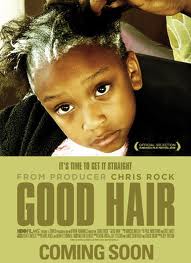 Tonight I finally got around to watching Chris Rock’s documentary film, Good Hair. The movie has caused a lot of buzz in the Black community and a lot of interest around our house. It’s fascinating, illuminating, hilarious, and thought-provoking.
Tonight I finally got around to watching Chris Rock’s documentary film, Good Hair. The movie has caused a lot of buzz in the Black community and a lot of interest around our house. It’s fascinating, illuminating, hilarious, and thought-provoking.
For me, watching this movie was like going down the rabbit hole. It brought up all kinds of memories and feelings about race, but also about beauty, and what it means in women’s lives.
At this point in my life, I seem to feel compelled to write about the things that are on my mind. But I must admit I’m reluctant to write about this. I’m White and my husband is Black. Given my family, I probably have more credibility in this area than some people would, but in the final analysis, I am still only Caucasian. And I’ve just picked up a social hot potato. I’m imagining an audience of Black sisters out there, reading this. Please, ladies, cut me a little slack. I know I can’t really get it, but I’m trying.
Thirteen years ago, after my husband’s sister died, her three daughters came to live with us. When the White women in my life heard about our expanding family, they said things like, “Three little girls? With all they’ve been through? And at your age? Are you sure?” (Translate that to: “Have you lost your ever-loving mind?”)
The Black women in my life said, “But what about hair? You don’t know anything about taking care of their hair.”
My friend Norma (the friend I’ve mentioned before, in hospice) is Black. In her usual matter-of-fact way, she said, “You’ll do fine.” Then she gave me the phone number for her hairdresser.
“Good grief,” I said to my husband. “I can love them, educate them, and show them how to grow up to be happy and productive. It’s not brain surgery. It’s only hair.” I was right, of course. And I was completely clueless.
I once read that adopting children is like falling in love. I had fallen in love with these little girls the first time I met them. But as is true in all love affairs, living together brings new revelations. One of the biggest revelations was their feelings about their hair. They wanted it straightened, and right now.
Using my best mothering communications skills, I tried to explore the issue. I explained that I was uncomfortable with the strong chemicals in relaxers, especially for children. I offered the thought that they were beautiful just the way they were. I invited them to think about some more natural hairstyles. I encouraged them to love their hair as it grew from their heads.
One weekend we went to visit some homeschool friends. The mother was a singer who wore dreadlocks. Her two daughters’ hair had never been treated, and they wore it natural. On the drive home, of course, we resumed the hair conversation. My oldest niece had finally had enough, and she made a statement that left me stunned. “You don’t understand, and you won’t ever understand. You have nice, straight White person hair. We have ugly (insert the “N word” here) hair.”
Her words pierced my heart. These beautiful, intelligent, personable children had completely accepted the idea that they were somehow less, because society told them straight hair is inherently better than kinky hair.
Over the next few years, there were hundreds of conversations about hair, and about gradations of color, and the shape of noses and lips. This story was new only to me, of course. Women of color in this country have all grown up with this pain, and have had to help their own children navigate the land mines of a majority culture that values blond hair and blue eyes and white skin above any other look.
On the subject of hair, we compromised. They went to Norma’s stylist and she straightened their hair with a hot comb. When we spent summer days in the pool, she muttered about White women who don’t know how to raise Black children, and constantly undo all her hard work. When they got into their teens, they had relaxer perms, and braids, and eventually, weave. They learned to love themselves more, and of course, that was about a lot more than hair. I broadened my thinking, and came to appreciate their desire to style their hair so it was easier to comb, and could be arranged in different ways, and to have the feeling of long hair that moves and swings.
After all these years, the conversation continues. My girls are young women now, and if you’re going to have Black women in your life, you’re going to talk about hair. A lot. See the movie, and you’ll know what I mean.
Dear Jillian,
You are a sweetheart. What matters most is you opened your heart to these girls. It’s more than hair and yes, I can say that-I’m black.
Please continue to write. You’re a caring sensitive being. Glad you are on the planet.
Namaste,
Linda
Hi, Linda – somehow your comment went into spam, and I just found it. Thank you for such kind words! As for the girls, they were pretty irresistible! I will keep writing – please keep reading 🙂 Jillian